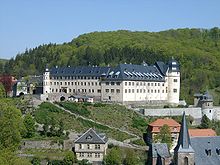- County of Stolberg
-
County of Stolberg
Grafschaft StolbergState of the Holy Roman Empire 1210–1548  →
→

Coat of arms
Capital Stolberg Government County Historical era Middle Ages - Established 1210 - Inherited Wernigerode 1429 - Upper Saxon Circle 1512 - Division into Harz and
Rhenish lines1548 The County of Stolberg (German: Grafschaft Stolberg) was a county of the Holy Roman Empire located in the Harz mountain range in present-day Saxony-Anhalt, Germany.
The town of Stolberg was probably founded in the 12th century as a mining settlement. The Counts of Stolberg (Grafen zu Stolberg) probably derived from a branch of the counts of Hohnstein castle near Nordhausen in Thuringia. The castle of Stolberg was first mentioned in 1210 as Stalberg, then the seat of one count Henry originally from nearby Voigtstedt. It remained a property of the comital family until its expropriation in 1945.
The Stolberg lands, which were located mostly east of the Harz, included Stolberg, Hayn, the lower County of Hohnstein (1417), as well as Kelbra and Heringen (1413/17), the two latter territories being ruled alongside the House of Schwarzburg.
The Counts of Stolberg could significantly enlarge their territory when they inherited the County of Wernigerode in 1429, the County of Königstein in 1535, and the County of Rochefort in 1544. The Protestant Reformation was introduced into their territory in 1539. On 19 March 1548 the line was split between a Harz line (Stolberg-Stolberg) and a Rhenish line with the possessions in Rochefort (Stolberg-Rochefort) and Königstein im Taunus (Stolberg-Königstein).
See also
- House of Stolberg
References
- Köbler, Gerhard (1988). Historisches Lexikon der deutschen Länder. Munich: Verlag C. H. Beck. pp. 639. ISBN 3406332900. (German)
- Schwineköper, Berent (1987). Handbuch der historischen Stätten Deutschlands, Band 11, Provinz Sachsen/Anhalt. Stuttgart: Alfred Kröner Verlag. pp. 644. ISBN 3-520-31402-9. (German)
External links
- Stolberger-Geschichte.de (German)
 Upper Saxon Circle (1512–1806) of the Holy Roman Empire
Upper Saxon Circle (1512–1806) of the Holy Roman EmpireElectorates 
Ecclesiastical Secular Anhalt (Bernburg · Köthen · Zerbst) · Barby · Hatzfeld-Gleichen · Pomerania (Further · Hither) · Querfurt · Reuss (Elder · Junior) · Saxe-Altenburg · Saxe-Coburg · Saxe-Eisenach · Saxe-Gotha · Saxe-Weimar · Schwarzburg (Rudolstadt · Sondershausen)Prelates Counts / Lords Hohnstein · Lohra / Klettenberg · Mansfeld · Schönburg (Saale) · Stolberg (Stolberg · Wernigerode · Rossla)Categories:- Former countries in Europe
- States of the Holy Roman Empire
- States and territories established in 1210
- States and territories disestablished in 1548
- 1548 disestablishments
- History of Saxony-Anhalt
- Harz
- Saxony-Anhalt geography stubs
- German history stubs
- Harz Mountain geography stubs
Wikimedia Foundation. 2010.
Look at other dictionaries:
County of Wernigerode — Grafschaft Wernigerode State of the Holy Roman Empire ← … Wikipedia
Stolberg-Wernigerode — County of Stolberg Wernigerode Grafschaft Stolberg Wernigerode State of the Holy Roman Empire (until 1806) ← … Wikipedia
County of Blankenburg — (till 1707) Principality of Blankenburg (since) Grafschaft Blankenburg (till 1707) Fürstentum Blankenburg (since) State of the Holy Roman Empire (until 1806) … Wikipedia
Stolberg-Stolberg — Infobox Former Country native name = Grafschaft Stolberg Stolberg conventional long name = County of Stolberg Stolberg common name = Stolberg Stolberg| continent = Europe region = Central Europe country = Germany era = Middle Ages status = Vassal … Wikipedia
Stolberg-Rossla — Infobox Former Country native name = Grafschaft Stolberg Roßla conventional long name = County of Stolberg Rossla common name = Stolberg Rossla| continent = Europe region = Central Europe country = Germany era = Early Modern era status = Vassal… … Wikipedia
County of Sponheim — Grafschaft Sponheim State of the Holy Roman Empire ← … Wikipedia
County of Veldenz — Grafschaft Veldenz State of the Holy Roman Empire ← … Wikipedia
Christian Ernest of Stolberg-Wernigerode — Stolberg Wernigerode, Christian Ernst zu Count of Wernigerode In office 1710–1771 Preceded by Ernst zu Stolberg Succeeded by Heinrich Ernst zu Stolberg Wernigerode Secret Councillor … Wikipedia
Christian Frederick of Stolberg-Wernigerode — Spouse(s) Countess Auguste Eleonore of Stolberg Stolberg Noble family House of Stolberg Father Henry Ernest of Stolberg Wernigerode Mother Princess Anna of Anhalt Köthen Born 8 January 1 … Wikipedia
Otto of Stolberg-Wernigerode — Otto zu Stolberg Wernigerode Vice Chancellor of Germany In office 1 June 1878 – 20 June 1881 Chancellor Otto von Bismarck Succeeded by Karl Heinrich von Boetti … Wikipedia

